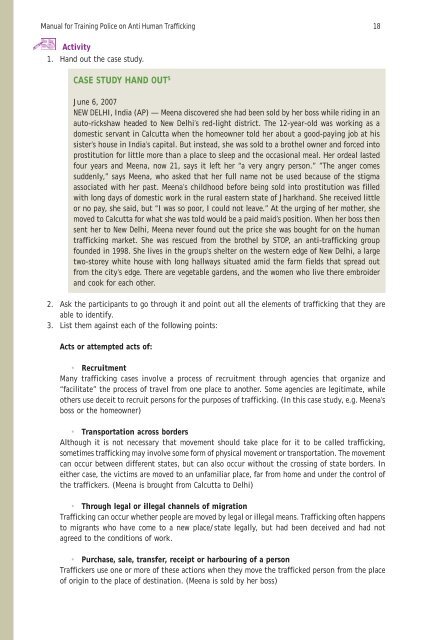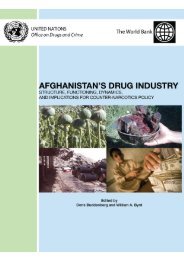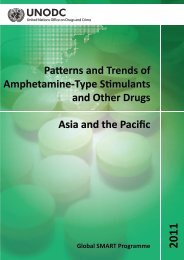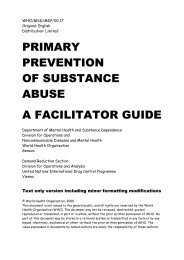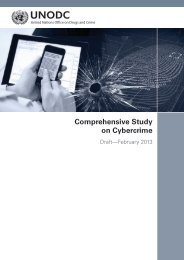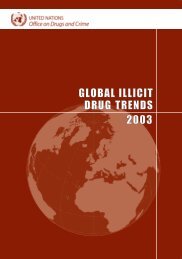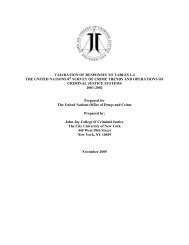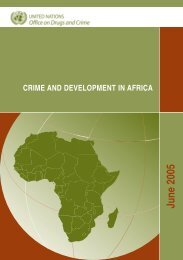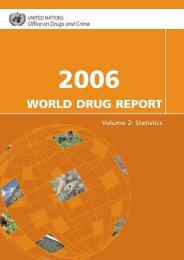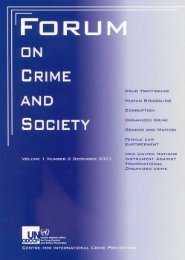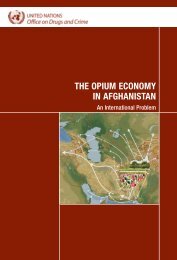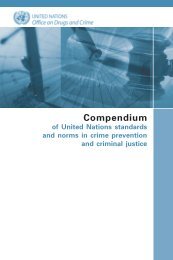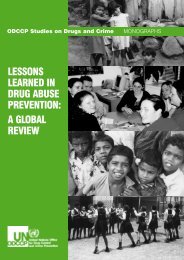Manual for Training Police on Anti Human Trafficking
Manual for Training Police on Anti Human Trafficking
Manual for Training Police on Anti Human Trafficking
Create successful ePaper yourself
Turn your PDF publications into a flip-book with our unique Google optimized e-Paper software.
<str<strong>on</strong>g>Manual</str<strong>on</strong>g> <str<strong>on</strong>g>for</str<strong>on</strong>g> <str<strong>on</strong>g>Training</str<strong>on</strong>g> <str<strong>on</strong>g>Police</str<strong>on</strong>g> <strong>on</strong> <strong>Anti</strong> <strong>Human</strong> <strong>Trafficking</strong> 18<br />
Activity<br />
1. Hand out the case study.<br />
CASE STUDY HAND OUT 5<br />
June 6, 2007<br />
NEW DELHI, India (AP) — Meena discovered she had been sold by her boss while riding in an<br />
auto-rickshaw headed to New Delhi’s red-light district. The 12-year-old was working as a<br />
domestic servant in Calcutta when the homeowner told her about a good-paying job at his<br />
sister’s house in India’s capital. But instead, she was sold to a brothel owner and <str<strong>on</strong>g>for</str<strong>on</strong>g>ced into<br />
prostituti<strong>on</strong> <str<strong>on</strong>g>for</str<strong>on</strong>g> little more than a place to sleep and the occasi<strong>on</strong>al meal. Her ordeal lasted<br />
four years and Meena, now 21, says it left her “a very angry pers<strong>on</strong>.” ”The anger comes<br />
suddenly,” says Meena, who asked that her full name not be used because of the stigma<br />
associated with her past. Meena’s childhood be<str<strong>on</strong>g>for</str<strong>on</strong>g>e being sold into prostituti<strong>on</strong> was filled<br />
with l<strong>on</strong>g days of domestic work in the rural eastern state of Jharkhand. She received little<br />
or no pay, she said, but “I was so poor, I could not leave.” At the urging of her mother, she<br />
moved to Calcutta <str<strong>on</strong>g>for</str<strong>on</strong>g> what she was told would be a paid maid’s positi<strong>on</strong>. When her boss then<br />
sent her to New Delhi, Meena never found out the price she was bought <str<strong>on</strong>g>for</str<strong>on</strong>g> <strong>on</strong> the human<br />
trafficking market. She was rescued from the brothel by STOP, an anti-trafficking group<br />
founded in 1998. She lives in the group’s shelter <strong>on</strong> the western edge of New Delhi, a large<br />
two-storey white house with l<strong>on</strong>g hallways situated amid the farm fields that spread out<br />
from the city’s edge. There are vegetable gardens, and the women who live there embroider<br />
and cook <str<strong>on</strong>g>for</str<strong>on</strong>g> each other.<br />
2. Ask the participants to go through it and point out all the elements of trafficking that they are<br />
able to identify.<br />
3. List them against each of the following points:<br />
Acts or attempted acts of:<br />
Recruitment<br />
Many trafficking cases involve a process of recruitment through agencies that organize and<br />
“facilitate” the process of travel from <strong>on</strong>e place to another. Some agencies are legitimate, while<br />
others use deceit to recruit pers<strong>on</strong>s <str<strong>on</strong>g>for</str<strong>on</strong>g> the purposes of trafficking. (In this case study, e.g. Meena’s<br />
boss or the homeowner)<br />
Transportati<strong>on</strong> across borders<br />
Although it is not necessary that movement should take place <str<strong>on</strong>g>for</str<strong>on</strong>g> it to be called trafficking,<br />
sometimes trafficking may involve some <str<strong>on</strong>g>for</str<strong>on</strong>g>m of physical movement or transportati<strong>on</strong>. The movement<br />
can occur between different states, but can also occur without the crossing of state borders. In<br />
either case, the victims are moved to an unfamiliar place, far from home and under the c<strong>on</strong>trol of<br />
the traffickers. (Meena is brought from Calcutta to Delhi)<br />
Through legal or illegal channels of migrati<strong>on</strong><br />
<strong>Trafficking</strong> can occur whether people are moved by legal or illegal means. <strong>Trafficking</strong> often happens<br />
to migrants who have come to a new place/state legally, but had been deceived and had not<br />
agreed to the c<strong>on</strong>diti<strong>on</strong>s of work.<br />
Purchase, sale, transfer, receipt or harbouring of a pers<strong>on</strong><br />
Traffickers use <strong>on</strong>e or more of these acti<strong>on</strong>s when they move the trafficked pers<strong>on</strong> from the place<br />
of origin to the place of destinati<strong>on</strong>. (Meena is sold by her boss)


